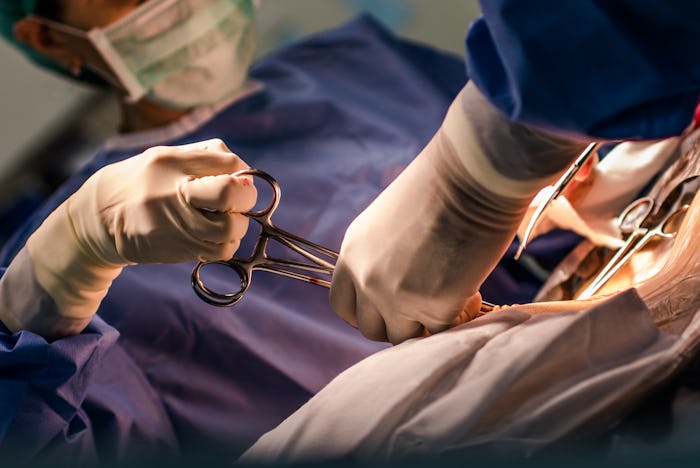Life

Can a C-Section Affect Bonding With Your Baby?
There is already so much to consider when you're about to have a child that the last thing you should need to worry about is if the manner in which you give birth could affect how you bond with your baby. But, can a C-section affect bonding with your baby? The answer is a complex one.
According to the Medical Center at the University of California, Davis, early bonding is critical for the emotional well-being of the baby and the mother. This is a stage in the relationship where the link between caretaker and baby begin to cement. That bond will travel with your child throughout their entire lives, and it begins at birth. So what happens if you don't have instant access to your baby after giving birth? Is this just a bump in the road, or can it have possible long-term consequences?
I spoke to family counselor Rhoda Hodgeman, Ph.D. and author of the forthcoming book, When I Look at You: Perceptions of Bonding, about how a C-section may alter the bonding process for mother and child. She tells Romper, "It used to be a much bigger concern. We're past the time where the mother would be put under a general anesthesia to deliver her child, and then wouldn't see the baby for hours afterwards. For the past five or 10 years, most hospitals acknowledge the importance of that skin-to-skin contact between mother and child right after baby is born, and have adapted gentler methods for delivery."
Hodgeman notes that it's up to the hospital, but that most now offer the opportunity for the mother to have the baby placed directly on her chest, horizontally, so that they may begin the bonding process. "But there will always be cases where this simply isn't possible," she adds. "And in those cases, it may be that the initial bonding process is a bit slower, and that breastfeeding may be a bit more difficult initially, but as beneficial as that period of time is, it's not the be-all and end-all in the bonding process."
According to Hodgeman, the first hours after your baby is born is just that — the first hours of their life. That time is hugely beneficial, but it's important to consider the fact that a healthy mother is also incredibly important to bonding with your baby.
"Ideally, we'd all be kangaroo carrying our babies as soon as they're born, and nursing shortly afterwards, but sometimes that's not possible, and mothers shouldn't beat themselves with worry about it," Hodgeman says. She suggests that as long as the mother actively seeks out bonding as soon as she's able, then the bonding process should proceed normally. "Sometimes we get too hung up on things that studies are telling us are beneficial without considering that there are many other things that are just as beneficial, like caring enough about the bonding process to seek out information about it, and that should tell the mother that she's already on the right path."
The bottom line is that while C-sections may make certain aspects of bonding a bit trickier at times, the way you give birth isn't a mandate on how you'll bond with your baby or the kind of relationship you'll have. Be confident in yourself and know that you're doing all you can to make sure you and the little one are happy and healthy, and that's the most important thing.